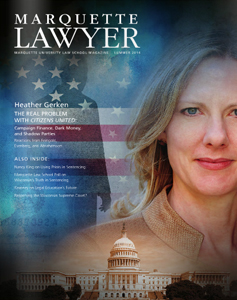 Past, present, future—the Summer 2014 Marquette Lawyer focuses its attention on important and interesting facets of all three. But let us draw your attention to it foremost for its thoughts on the future, including:
Past, present, future—the Summer 2014 Marquette Lawyer focuses its attention on important and interesting facets of all three. But let us draw your attention to it foremost for its thoughts on the future, including:
The future of campaign spending. In the cover story, Heather K. Gerken, the J. Skelly Wright Professor at Yale Law School, examines the impact of the Citizens United decision of 2010, in The Real Problem with Citizens United: Campaign Finance, Dark Money, and Shadow Parties. Based on her Boden Lecture last fall at Marquette Law School, Gerken suggests that the case’s most important result could be a gulf between the elites involved in national political campaigns and the rank and file party members who have historically been the backbone of the parties. The article may be found by clicking here.
The future of the use of prior convictions in sentencing. Nancy J. King, the Lee S. and Charles A. Speir Professor at Vanderbilt Law School, outlines the history of the use of prior convictions in determining sentences in Once a Criminal . . . ? Regulating the Use of Prior Convictions in Sentencing. Based on her George and Margaret Barrock Lecture in Criminal Law at Marquette Law School, King’s essay advocates for greater use of procedural safeguards in making sure that the relevance of priors to a new sentence is established. The article may be found by clicking here.
The future of truth in sentencing in Wisconsin. While public opinion continues to support truth in sentencing practices, Professor Michael O’Hear, associate dean for research at Marquette Law School, and Darren Wheelock, an associate professor in Marquette’s Department of Social and Cultural Sciences, analyze results from the Marquette Law School Poll and find a more nuanced picture. Yes, No, and It Depends describes a “swing group” of Wisconsinites who support both truth in sentencing and early release from prison in some circumstances. That could lead to policies allowing some forms of early release. The article may be found by clicking here.
The future of Wisconsin’s Supreme Court. One Term, Sixteen Years describes the recommendation of the board of governors of the State Bar of Wisconsin that the state constitution be amended so that justices would be elected for 16-year terms, with no allowance for second terms. The future of the idea depends largely on what happens within the state legislature. The article may be found by clicking here.
The future of legal education. Dean Joseph D. Kearney’s remarks to the Fellows of the Wisconsin Law Foundation engage the debate about changes in legal education that some favor. The article may be found by clicking here.
Also in the magazine are class notes and profiles of three Marquette Lawyers (Eric Van Vugt, L’76, Cindy Davis, L’06, and Peter Roan, L’85), plus remarks by Professor Alan R. Madry at the Law School’s midyear graduation, a round-up of some of the public policy programs at Eckstein Hall during the 2013-14 school year, an article on the Law School’s wide-ranging internship programs for law students, and an introductory column by the dean.
The full magazine may be found by clicking either on this PDF or this interactive version. Past issues are available here.
